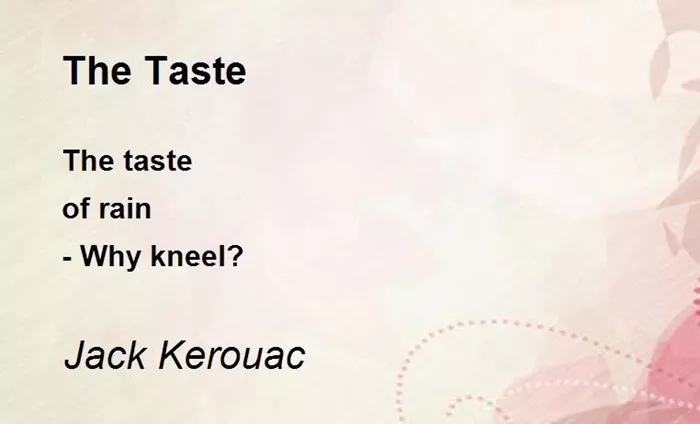Welcome to Poem of the Day – The Taste of Rain by Jack Kerouac.
Jack Kerouac, often hailed as the voice of the Beat Generation, had an innate ability to distill profound truths into deceptively simple words. His poem, The Taste of Rain, exemplifies this gift through its brevity and layered meaning. Though just four words—”The taste of rain”—this poem encapsulates Kerouac’s philosophy of mindfulness, his reverence for nature, and his penchant for celebrating the ephemeral beauty of existence.
The Taste of Rain Poem
The taste
of rain
—Why kneel?
The Taste of Rain Explanation
The Power of Minimalism
Kerouac’s poem is an exercise in minimalism. With a mere fragment of a sentence, he captures an entire world of sensory and emotional experience. Minimalism in poetry relies on the reader to actively participate in the interpretative process, and The Taste of Rain exemplifies this principle. Its simplicity invites contemplation: what does rain taste like? Is it literal, figurative, or both?
Kerouac’s choice to leave the poem open-ended reflects the Zen Buddhist influence on his work. Zen teachings often emphasize simplicity and the importance of direct experience over analysis. In this sense, the poem becomes a koan—a paradoxical phrase or question meant to transcend rational thought. The brevity forces the reader to engage fully with the moment, much like the experience of tasting rain itself.
Nature as a Reflection of Life
Kerouac frequently used nature as a metaphor in his work, and The Taste of Rain is no exception. Rain, a universal and transient phenomenon, embodies impermanence, a core tenet of Buddhism. Each droplet exists momentarily before vanishing, much like human experiences and emotions. Yet, in that fleeting existence, rain nourishes life, cleanses the earth, and creates moments of unexpected beauty.
The poem’s focus on taste emphasizes the intimacy of the experience. To taste something is to engage deeply with it, to bring it into oneself. In this way, Kerouac elevates rain beyond a mere weather event; it becomes a symbol of communion with the world. By tasting the rain, one absorbs the essence of life, embracing its fleeting beauty and grounding oneself in the present.
Mindfulness and the Present Moment
Kerouac’s poem aligns closely with the practice of mindfulness—a concept that has gained popularity in modern times but was a cornerstone of the Buddhist philosophy Kerouac admired. Mindfulness encourages individuals to immerse themselves fully in the present moment, to observe without judgment, and to appreciate the world as it is.
Tasting rain is inherently an act of mindfulness. It requires one to pause, to extend a hand or tilt a face upward, to savor something as ordinary as rain and transform it into something extraordinary. This act of noticing transforms the mundane into the sacred, a recurring theme in Kerouac’s body of work.
Connection to Kerouac’s Broader Philosophy
The poem resonates with the themes found in Kerouac’s prose, particularly in works like On the Road and The Dharma Bums. In these texts, Kerouac celebrates a life of spontaneity, discovery, and a rejection of societal conventions. His characters often seek transcendence in everyday experiences, whether through travel, relationships, or communion with nature.
In The Taste of Rain, this philosophy is distilled into its purest form. There are no characters, no plot, no extraneous details—only the essence of an experience. The poem acts as a microcosm of Kerouac’s broader worldview, urging readers to find meaning in the small, overlooked moments that make up the fabric of life.
Interpretations and Legacy
Kerouac’s The Taste of Rain has been interpreted in countless ways, a testament to its enduring appeal. Some view it as an ode to childhood innocence, recalling the joy of playing in the rain. Others see it as a meditation on the cyclical nature of life, with rain symbolizing renewal and rebirth.
The poem’s legacy lies in its ability to resonate across time and culture. Its simplicity allows it to transcend linguistic and philosophical barriers, offering readers a moment of shared humanity. Like a raindrop, the poem is small yet profound, containing multitudes within its brevity.
Conclusion
Jack Kerouac’s The Taste of Rain is a masterpiece of minimalism, a four-word poem that speaks volumes about mindfulness, the beauty of impermanence, and the power of nature. By focusing on a singular, sensory experience, Kerouac invites readers to pause and savor the world around them. In doing so, he transforms something as ordinary as rain into an extraordinary reminder of life’s fleeting yet exquisite beauty. This poem, though short, serves as a poignant testament to Kerouac’s ability to find the profound in the simple, the eternal in the ephemeral.

